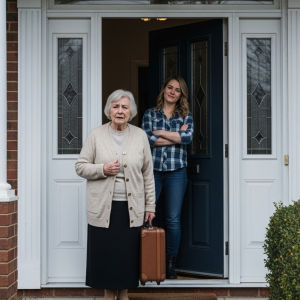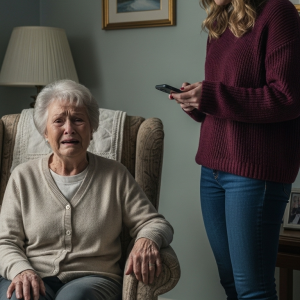The bank notification for the $3.2 million villa purchase hit my son’s phone at exactly 10:47 AM. By noon, my own phone was buzzing like an angry hornet. By evening, I was the most talked-about woman in Connecticut. It only took shattering my family’s financial expectations to finally make them see me.
Let me paint you the picture. Three days ago was March 15th, my 64th birthday. But according to my son, Brian, and his darling wife, Sarah, it somehow managed to sneak up on them again this year. What a remarkable coincidence that it happened to fall during their annual spring spa weekend in Vermont with Sarah’s mother, Patricia Wells, whose birthday conveniently lands on March 12th.
I’m not a fool. I figured out their little dance about five years ago, after my husband passed. For years, my birthday had been treated like a scheduling inconvenience, always eclipsed by some manufactured crisis or celebration for Patricia. This year, instead of my usual routine of subtle hints and not-so-subtle guilt trips, I decided to try something different. I said absolutely nothing.
When they packed their bags, their faces etched with practiced guilt, I just smiled and waved. The moment their car disappeared down the long driveway of the house I no longer wanted, I called my real estate agent. “Jennifer,” I said, my voice clear and firm, “find me the most beautiful waterfront property you can locate within fifty miles. Money is no object.”
She thought I was joking. Four hours later, as we stood in the marble foyer of a stunning contemporary villa overlooking Long Island Sound, she realized I wasn’t. The place was a masterpiece of glass and light. It had floor-to-ceiling windows that erased the boundary between inside and out, a gourmet kitchen that cost more than a luxury car, and a master suite with a deck that made you feel like you were floating above the water.
“It’s $3.2 million, Mrs. Thompson,” Jennifer said carefully, as if delivering bad news.
“I’ll take it,” I replied.
“Don’t you want to… discuss it with your family?”
I almost laughed. When was the last time my family discussed anything of substance with me? “Jennifer, I’m 64 years old. I’ve been thinking for most of them. Wire the funds tomorrow.”
That was Tuesday. By Wednesday, the deed was in my name. By Thursday morning, I was curating my social media debut. I posted photos of the living room with its sweeping ocean views, the kitchen island where I’d arranged a small birthday celebration for one, and the deck where I’d enjoyed my first solo birthday dinner in decades. The caption was simple: “Birthday celebrations at my new home. Sometimes the best gifts are the ones you give yourself.”
And that’s when my phone began to ring.
Brian was first, of course. His name flashed on my screen at 10:52 AM, just five minutes after the bank alert for a massive wire transfer would have hit his phone. You see, Brian had made himself a joint account holder on my main account years ago, for “emergencies.” It was his thoughtful way of keeping tabs on me, ensuring I wasn’t making any foolish decisions with my money. I let it go to voicemail.
The calls kept coming, a frantic cascade of concern, confusion, and barely controlled panic. Sarah. Patricia Wells herself. Brian again, and again. By 2:00 PM, I had seventeen missed calls. My personal favorite text was from Sarah: Mom Thompson, we’re worried about you. This isn’t like you. Please call so we know you’re okay.
Isn’t like me. Darling, you have no idea what I’m like. You’ve only ever known the version of me that bends over backwards to accommodate everyone else. Today, you’re meeting Margaret Thompson, property owner and woman of independent means.
What none of them knew, what they hadn’t bothered to ask about in the five years since Dad died, was Aunt Helen’s inheritance. Sweet, unmarried Aunt Helen, who lived quietly in her Boston brownstone and collected vintage jewelry. The same Aunt Helen they couldn’t be bothered to attend the funeral for last September. Aunt Helen, who left her entire estate—$7.3 million, to be exact—to her dear niece Margaret, the only family member who ever took the time to visit.
I poured a glass of wine from my new wine fridge and sat on my new deck, watching the sun set over water that was finally, completely, mine. Tomorrow would bring the family storm. But tonight was just for me.
The inheritance that changed everything had been sitting in my bank account for six months before I even told Brian that Aunt Helen had passed away. To my family, she barely existed. Helen was my father’s sister, a woman who’d chosen a career over marriage back when that was still a scandal. She was sharp, funny, and completely unapologetic about living on her own terms.
When she was diagnosed with pancreatic cancer, I was the one who sat with her through chemo, the one who held her hand when she died on a quiet Tuesday morning in September. Brian and Sarah sent flowers to the funeral; they were at a wine-tasting weekend in Napa and couldn’t possibly change their plans.
After the service, Helen’s lawyer handed me a letter.
Dearest Margaret,
I’ve left you everything. Not because you’re my only living relative, but because you’re the only one who ever saw me as a person rather than an obligation. I’ve been watching your family dynamics for years. That son of yours loves you, but he’s been programmed by that wife and her mother to see you as a burden to be managed, not a woman to be respected. They convince you that you’re fragile, that you can’t be trusted. It’s a subtle form of control. Don’t let them do it to you. Use this inheritance to remember who you were before you became someone’s mother, someone’s wife. Live boldly.
For months, I kept the inheritance a secret, watching my family with Helen’s words echoing in my mind. The condescending smiles when I expressed an opinion. The way they made plans without consulting me. The assumption that I would always be available. When March rolled around with the familiar pattern of my birthday being sacrificed for Patricia Wells’ latest manufactured drama, I knew exactly what Helen wanted me to do. I wanted to stop being invisible.
My phone lit up again. Brian. This time, I answered.
“Mom, thank God! Where are you? What’s going on? You bought a $3.2 million house?”
“I did,” I said calmly. “It’s lovely. Waterfront, just like I always wanted.”
There was a stunned silence. “Mom, are you feeling all right? This is very unlike you. You should have consulted with us first.”
“Should I have? Why, Brian?”
“Because… because you can’t afford this! Dad’s life insurance was comfortable, but not this comfortable. What were you thinking?”
And there it was. The core assumption that had governed our relationship for years. Brian had decided I was financially fragile, a woman who needed to be managed.
“Brian,” I said softly, “there are quite a few things about my financial situation that you don’t know.”
“What’s that supposed to mean?”
“It means I’m not the helpless widow you’ve been treating me like. And it means this conversation is far from over.” I hung up, turned off the phone, and poured another glass of wine. The message had been sent. Now, it was time to see how they would respond.
Brian arrived at 7:30 the next morning, looking like a man who had driven through the night fueled by panic and caffeine. “Mom, this is insane,” he said, his eyes scanning the cavernous kitchen. “The property taxes alone on this place will be astronomical.”
“About $32,000 annually,” I said, pouring him a coffee. “Already budgeted for.”
He stared at me. “How? Dad’s life insurance was $400,000. You don’t have this kind of money.”
I sat down at the magnificent marble island. “Brian, when was the last time you actually looked at my bank statements, not just monitored them for suspicious activity?”
“I check them to protect you from scams, from poor decisions…” his voice trailed off.
“What you’ve been doing is monitoring my spending without understanding my income. I inherited $7.3 million from Aunt Helen last September.”
His coffee mug stopped halfway to his lips. “What? And you didn’t tell me?”
“Should I have? You’ve spent the last five years convincing me I’m not capable of making my own financial decisions. You treat me like an incompetent child. Why would I consult with someone who thinks I need supervision to buy groceries?”
His face flushed with a familiar teenage shame. “I was trying to help! Sarah said seniors often make poor financial choices…”
“So you decided to control my spending instead of respecting my intelligence? Brian, you have been treating me like a responsibility to be managed, not a person with her own desires.”
He was quiet for a long time, the sparkle of the Long Island Sound reflecting in his conflicted eyes. When he finally looked at me, something had shifted. “I thought I was protecting you,” he said, his voice softer now.
“From what, sweetheart? From living my own life?”
That afternoon, we talked for hours, more honestly than we had in years. But I knew the real test was still to come. Sarah and Patricia would be back soon, and they were not going to accept this new, independent Margaret nearly as easily.
Two weeks after my conversation with Brian, I was cleaning out my late husband’s desk when I found a folder labeled Brian – Private. Inside were documents that painted a horrifying picture. My son owed nearly $50,000 in credit card debt. His mortgage was three months behind. And he had taken out a second mortgage on his house by forging my signature as a co-signer, just two months after his father’s funeral.
The worst part wasn’t just the fraud; it was the dates. Every financial crisis in these documents, every desperate loan application, coincided perfectly with one of Patricia Wells’ mysterious “health emergencies” and a rushed trip to Vermont.
I immediately called Marcus Reed, Helen’s lawyer. His investigation confirmed my fears. Brian had not only forged the mortgage documents, but had also taken out two credit cards and a personal loan in my name. My excellent credit score had been systematically destroyed.
Just as I was processing this betrayal, the doorbell rang. It was Sarah, clutching a peace offering from Vermont. “Patricia feels bad about how things went the other day,” she said with an awkward smile.
I let her in, my mind racing. “Sarah,” I said, getting straight to the point, “how long have you known about Brian’s financial problems?”
The color drained from her face. “What financial problems?”
“The credit card debt, the mortgage issues, the loans he’s taken out using my name without my permission.”
Her composure cracked. “He didn’t mean for it to go this far! It started small. And then… Patricia needed help. Her medical bills… for the experimental treatments.”
“What treatments?” I asked, my blood turning to ice.
“She has connections in medical research,” Sarah explained, her voice gaining a desperate conviction. “She’s been helping Brian invest in promising new therapies. When they pay off, we’ll make everything back, plus returns.”
“Sarah,” I said slowly, “Patricia Wells was an office manager at an insurance company. She has no connections to medical research. She’s been showing you fake documents to convince Brian to give her money he doesn’t have. Money he has stolen from me.”
“That’s not true!” she insisted, but her voice was shaking. “Patricia would never… She’s been like a mother to me.” She fled before I could say more, leaving behind a growing certainty that this was far deeper than I had imagined.
Marcus Reed called back two hours later with the final, sickening piece of the puzzle. Patricia Wells wasn’t her real name. It was Patricia Warren, and she had a criminal history spanning three states and twenty years for elder fraud and insurance scams.
“But Margaret,” Marcus said, his voice grim, “she isn’t working alone. She has a partner, someone who helps her research target families. Someone with intimate access.”
Then Brian called, his voice frantic. “Mom, Sarah’s gone. She left this morning. I found papers in her dresser… bank statements for accounts I didn’t know existed, and photos, Mom… photos of our house, Dad’s estate documents, even pictures of you with handwritten notes about your personality and assets.”
My world tilted. Marcus’s final report arrived via email moments later. Sarah’s maiden name wasn’t Mitchell. It was Warren. Patricia Warren had a daughter, Sarah Warren, born in 1985. They had been working together for at least eight years.
Brian hadn’t been targeted randomly. He’d been hunted. The woman he loved, the life he had built, was a meticulously crafted lie, an elaborate con designed to drain our family of everything we had.
With the help of the State Police Financial Crimes Unit, we began to unravel the full extent of the fraud. But as we started freezing accounts, Patricia made her move. She called me, her voice as calm and conversational as if she were asking for a recipe.
“Hello, Margaret. Or should I call you Patricia Warren?” I asked.
She laughed softly. “You’ve been busy. I’m impressed. But you’ve created a problem for me, Margaret. The police, the frozen accounts… it’s all very inconvenient.”
“Good,” I said.
“Not good, actually. Because I know things about your family. Your late husband’s business dealings, for instance. Some very questionable tax strategies, some shell companies. I have documentation that would destroy his reputation and result in massive penalties for his estate. Your estate, Margaret.”
The room spun. My husband, a tax evader?
“What do you want?” I whispered.
“Call off the investigation. Release the accounts. And a cashier’s check for $3 million as a gesture of goodwill. Or I release everything, and your son likely goes to prison as an accessory to his father’s crimes. He signed a lot of documents over the years, Margaret.”
She gave me 24 hours. The old Margaret would have paid. She would have protected her family’s secrets and her son’s future at any cost. But the new Margaret, the one who had bought a $3.2 million villa on her own terms, had a different idea.
“Detective,” I said, calling the police immediately after hanging up. “I just received a blackmail demand from Patricia Warren. I think it’s time to set a trap.”
The first step was the hardest. I had to tell Brian the truth about his father. We sat in my sun-drenched living room as I explained the tax evasion, the secrets Robert had kept, and the burden he had carried in his final years. It was a painful, ugly conversation, but for the first time since Robert’s death, there were no secrets between us.
“Are we going to prison, Mom?” he asked, his voice small.
“I don’t know,” I said honestly. “But I’m not paying blackmail to find out. Whatever consequences we face, we will face them together.”
That evening, Patricia called exactly on schedule. With Detective Rodriguez listening in and recording equipment capturing every word, I let her make her demand one last time.
“Have you made your decision, Margaret?”
“I have,” I said, my voice steady. “The answer is no.”
There was a stunned silence. “I don’t think you understand the consequences.”
“I understand them perfectly. You’re going to try to destroy my family’s reputation and cost us a lot of money. But I am done being afraid, Patricia. I am done letting people control me with threats. If my husband broke the law, his estate will pay the price. But I will not give you one more dollar.”
“You’re making a mistake, Margaret.”
“Maybe. But it’s my mistake to make. You see, Patricia, you made one critical error. You assumed I cared more about protecting my reputation than I cared about protecting my dignity. You were wrong.”
I hung up.
Patricia made good on her threats. The story of Robert’s financial crimes hit the local paper. The IRS launched a full-scale investigation. The damage was significant. I had to pay $1.8 million in back taxes and penalties. Brian faced potential charges, but his clear lack of knowledge and cooperation protected him from prosecution.
Through the legal and financial storm, something unexpected happened. Brian and I grew closer than we had been in years. Stripped of secrets and lies, we found our way back to each other.
Three months later, Detective Rodriguez called. Patricia and Sarah had been found in Mexico, running the same con on another family. They were extradited and faced a battery of federal charges: wire fraud, identity theft, extortion, conspiracy. They were looking at significant prison time. The authorities recovered about $400,000 of the stolen money. It wasn’t everything, but it was something.
A year later, life has found a new rhythm. I kept the villa, not because I need the space, but because it stands as a monument to the moment I chose to stop apologizing for taking up room in my own life. Brian sold the house he shared with Sarah and bought a smaller place near me. He visits twice a week, and our relationship is built on honesty, not assumptions.
I’m 65 now. I travel. I take art classes. I have friends who know me as Margaret, not just as someone’s mother or widow. Patricia and Sarah taught me a painful lesson: that kindness can be seen as weakness, and love as an opportunity for exploitation. But they also taught me that dignity isn’t something you protect by avoiding conflict. It’s something you claim by refusing to let others define your worth.
Sometimes, the best revenge isn’t getting even. It’s simply refusing to stay small in a world that keeps trying to shrink you.




